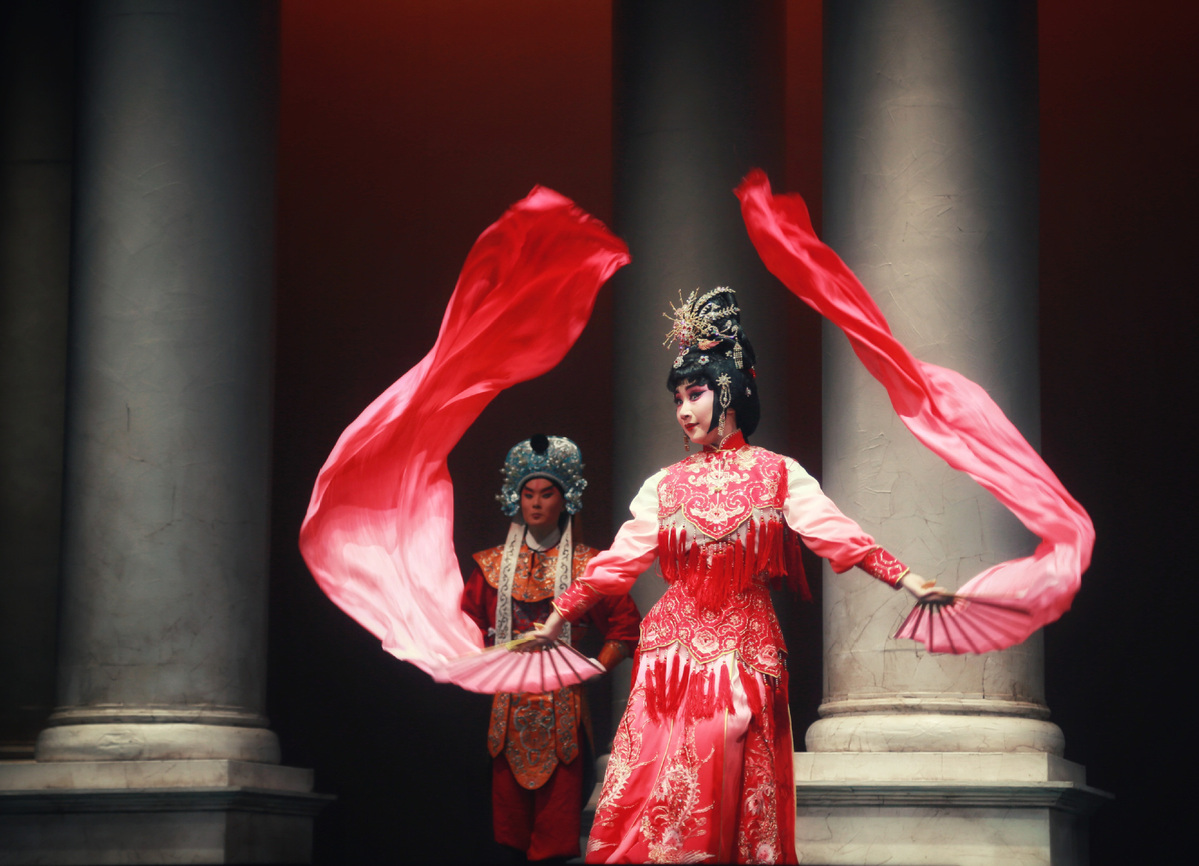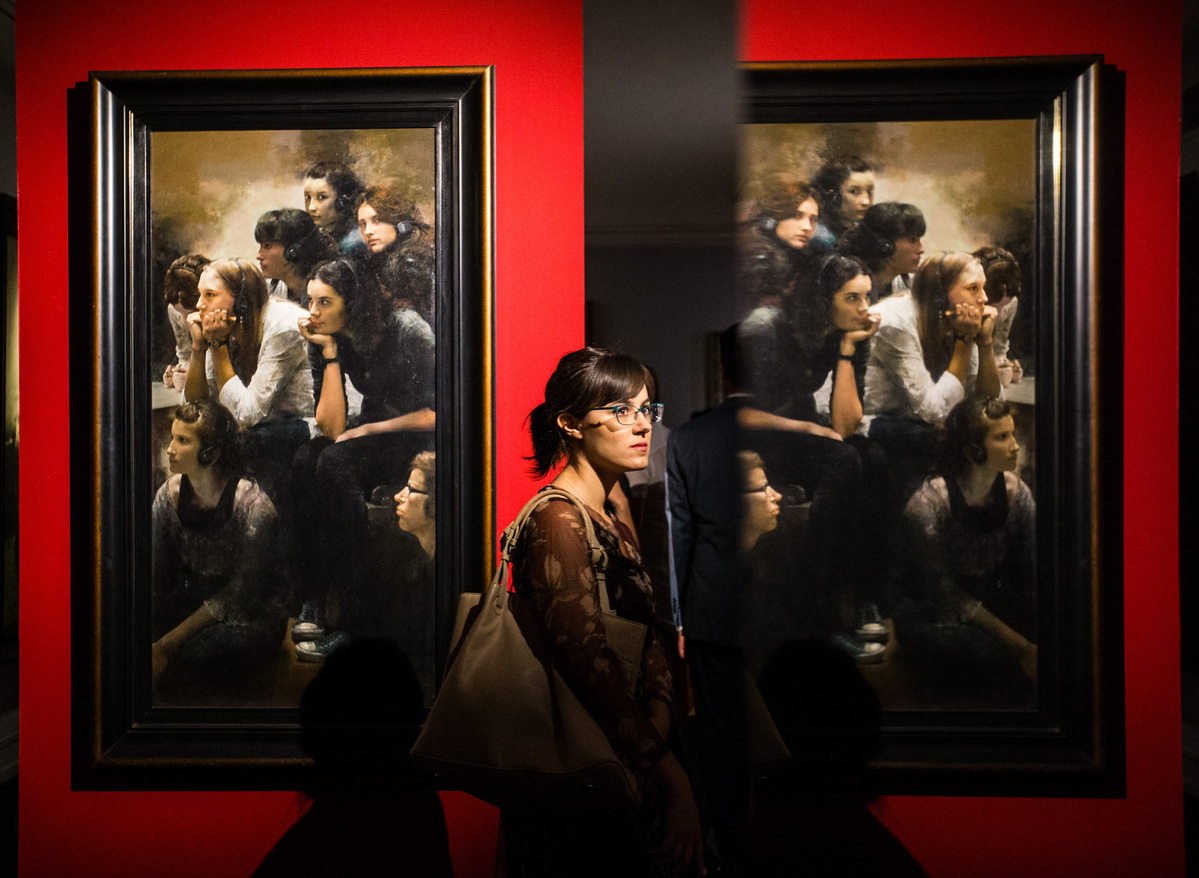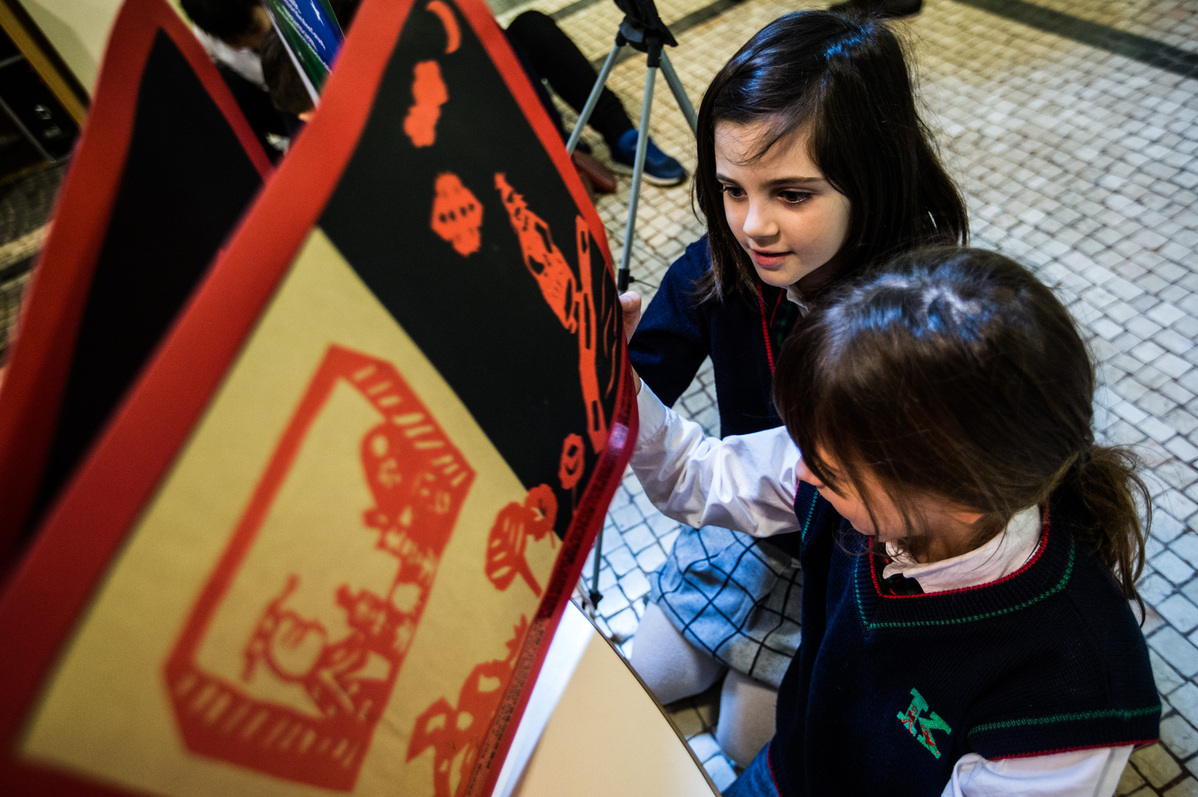 The experimental Peking Opera Turandot is performed in Rome, Italy, February 5, 2019. [Photo/ Xinhua]
The experimental Peking Opera Turandot is performed in Rome, Italy, February 5, 2019. [Photo/ Xinhua]
“Classical stories blending innovative elements provide people a new artistic experience. In the future, I will start to pay more attention to Peking Opera, which is really an ancient and magical stage art,” Italian archaeologist Simone said, expressing her love for the Sino-Italian experimental Peking Opera Turandot after its premiere at the Bolzano Theatre in Italy early this year.
This new Turandot, adapted from the Italian opera Turandot, is a co-production of the China National Peking Opera Company and the Italian Emilia-Romagna Theater Foundation. Performed by both Chinese and Italian artists, the play incorporates both Chinese and Western drama and music elements, trying to interpret the moving legend of “Chinese Princess” from a new perspective. It toured several Italian cities this year, including Ferrara and Rome.
The Peking Opera Turandot serves as another work jointly launched by China and Italy that integrates Chinese and Western art, following the experimental Peking Opera Faust in 2015. It enables Western audiences to appreciate the artistic charm of Chinese Peking Opera in their familiar stories and injects new vitality into Sino-Italian cultural exchanges.
Sino-Italian friendship is rooted in the long history of friendly exchanges. In recent years, cultural cooperation between the two countries has maintained a good momentum of development. Especially after the establishment of Sino-Italian cultural cooperation mechanism by the two governments in 2014, the cultural exchanges between the two countries have been gradually enriched, and the fields and levels of cooperation continuously expanded and enhanced.
 Visitors watch the oil paintings at “Chinese Resonance Oil Painting Exhibition”, in Rome, Italy, July 18, 2018. [Photo/ Xinhua]
Visitors watch the oil paintings at “Chinese Resonance Oil Painting Exhibition”, in Rome, Italy, July 18, 2018. [Photo/ Xinhua]
According to Li Ruiyu, ambassador of China to Italy, under the mechanism, China has participated in important cultural events such as Venice Biennale and Milan Design Week. China has participated in the 55th Bologna International Children’s Book Fair as the host country, organized art and relic exhibitions such as “Chinese Resonance Oil Painting Exhibition” and ” Civilization of Ancient Sichuan Exhibition”. Chinese original artistic works such as the opera “Red Army is not afraid of expeditions” and the dance drama “Dunhuang My Dreamland” entered the Italian local art festival and received high praise from Italian audiences.
Italy has actively participated in the Shanghai International Art Festival and the Beijing International Music Festival. Important projects such as “Pompeii- the Infinite Life Exhibition” successfully toured China, and Milan International Furniture Exhibition landed in Shanghai.
With the deepening of Sino-Italian cooperation under the Belt and Road Initiative, the demand for learning Chinese language and Chinese culture in Italy has also increased rapidly.
Since the first Confucius Institute in Italy was launched in Rome University in 2006, Italy has had 12 Confucius Institutes and nearly 40 Confucius classrooms, with more than 30,000 students registered for study. There are also more than 100 primary and secondary schools in Italy offering Chinese courses, and more than 40 universities offering Chinese majors. In 2016, the Italian government also promulgated the Chinese syllabus for Italian high schools.
 Italian students visit the book fair exhibiting Chinese children’s original books, at the 55th International Children’s Book Fair in Bologna, Italy, March 28, 2018. [Photo/ Xinhua]
Italian students visit the book fair exhibiting Chinese children’s original books, at the 55th International Children’s Book Fair in Bologna, Italy, March 28, 2018. [Photo/ Xinhua]
In the field of education, the Sino-Italian bilateral exchanges and cooperation have also developed rapidly. The two countries have carried out fruitful cooperation in sending foreign students, intercollegiate exchanges and language teaching. The two countries have maintained close exchanges through project cooperation and personnel exchanges. More than 20 universities and research institutes in China, such as Peking University and Tsinghua University, have established exchanges and cooperation with Italian universities.
Cooperation in the field of tourism between the two countries has also developed vigorously. In recent years, the scale of Chinese tourists has been expanding, and Italy has become one of the most popular European countries for Chinese tourists. According to Italy’s official figures, the number of Chinese tourists to Italy reached 1.5 million in 2017, and the number of Italian tourists to China also showed an upward trend.
Li Ruiyu said that in the future, China and Italy will explore and strengthen cooperation in the work related to UNESCO World Cultural Heritage, further boost publicity and attractiveness of the two’s cultural heritage, and through exchanges and cooperation in this field, the cultural exchanges, economic and trade cooperation between the two countries will be promoted.
The deepening cooperation between China and Italy in the field of culture not only builds a bridge between the two peoples but also provides a strong impetus for the all-round development of the bilateral ties between the two countries.